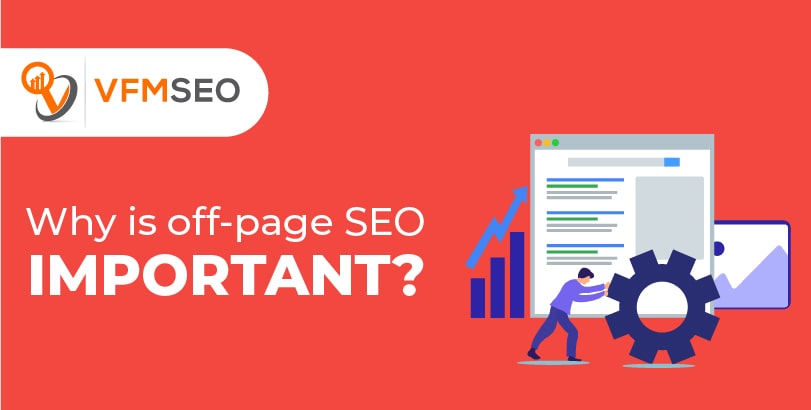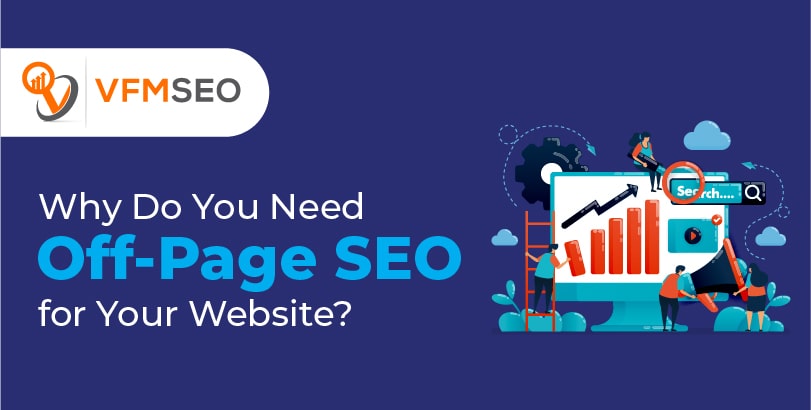
Off-page SEO Ranking Factors of 2021: Ultimate Guide
Off-Page SEO is a term for the collective set of activities that you do outside your website to build links that point to it. These links to your website are known as backlinks (links pointing back to your site). The main agenda for Off-Page SEO is to create quality, relevant and trustworthy backlinks.
Off-Page SEO comprises a particular set of activities, also known as link-building activities, including blogger outreach, forum posting, Q&A, broken-link building, blog commenting, influencer marketing, document and image submission, and Wikipedia link submission, etc.

Why is off-page SEO important?
Google considers multiple factors before ranking a particular page/website, and off-page is one among them. It is challenging to rank only via content; this is where your off-page or link building plays an important role. It, in a way, tells Google what others think about your site, and that is why having backlinks from quality, relevant websites becomes essential.
Off-page SEO involves building links from multiple sources. These links are of two types:
Do-Follow Links
A do-follow link is a default link type that allows Google bots or spiders to pass link juice or value to the link or web page linked. E.g., If a renowned fashion magazine, let’s say X, adds an article to their website and gives a do-follow link to a relevant business, let’s say Y, it means that X is giving some of their value to Y. This value helps Y achieve a better PageRank and rank better on SERP. The best way to use a do-follow link is to add a relevant keyword as the anchor text.
Google observes the number of do-follow links you get to your website and the number of separate domains you get it from. The more the number of do-follow links from multiple and relevant domains, the more the value is being passed.
No-Follow Links
A no-Follow link type means Google bots or spiders will not follow such links. They won’t pass any link-juice or value to the page where that is linked to. As no link juice is passed, no-follow links won’t have any influence on rankings. No-Follow links were introduced in an attempt to stop web spam.

Why Do You Need Off-Page SEO for Your Website?
Off-page SEO helps build a website’s recognition and domain authority. Without it, your site will continually rank below other websites that already have a more substantial lead. While links are not the only off-page signals that Google’s algorithm applies to rank a site, it is perhaps the most vital of the lot.
However, there are many other off-page SEO techniques or tactics that you should be practicing. This will help to gain success from off-page SEO content marketing and help in brand building.
To put it simply, brands would struggle to rank at competitive search terms without off-page SEO.
What are the essential factors to consider while doing off-page SEO?
Below are some of the off-page SEO factors to consider:
- Domain Authority
- Relevance
- Site Traffic
- Link Type
Domain Authority
Domain authority is a measurement metric or score created by Moz to give an overview of a site’s performance. When doing off-page activities, it is essential to consider domain authority. Domain authority, or simply DA, represents the quality of a website. If a backlink buy adderall 30mg online leads from a website with higher DA to a website with lower DA via a do-follow link, it helps the lower DA website have a better page rank and rank well in SERPs.
Relevance
It is vital to get links from higher DA sites; however, it is more important to be relevant to the one you want to link to. E.g., If you get a link from a fashion brand with a high DA to your website, which is all about car dealerships, it will not make sense, and excessive irrelevant backlinks can trigger algorithms for a penalty.
Site traffic
When doing off-page activities like forum posting, bloggers outreach, etc., it is essential to understand how much traffic these sites/people can drive towards you. E.g., if you wish to do a blogger outreach activity or forum submission, you will check those site’s traffic with a chrome extension like SEO Meta in Click. Once you confirm that the site’s traffic is substantial enough, you can proceed with the activities.
Link Type
There are two types of links that we build while doing link building or off-page activities. They are do-follow and no-follow Links, as elaborated above.
How Can We Avoid Penalties for Unnatural Links
Backlinks can significantly impact the performance of your website. However, it is a two-edged sword as unnatural backlinks can invite penalties from Google.
Recovering from a Google penalty can become a significant hurdle for websites, as it tarnishes the website’s image for the search engine. Over the past few years, Google has changed its vision from seeing backlinks from high PR websites to substantial impact. Google now prefers user optimization, valuable and authoritative content, and user intent. The purpose of search intent has overpowered high CTR websites.
Google has not clued in the SEO community about any particular processes for avoiding penalties. However, a few practices can help your website stay wary of these penalties and avoid the hassle of dealing with them. Let’s take a look at these practices.
User Optimized Content
Putting your users at the forefront when creating any content goes a long way in avoiding Google penalties. Gone are the days when techniques like keyword stuffing would go unnoticed. To optimize the content as user-first, you must prioritize the value of content rather than its sale value. Promotional content should be minimized, and valuable content must be prioritized. Integrate as much valuable data into your content as possible for the covered topic. This will keep you safe from getting penalized by Google for any techniques that the search engine might consider unethical.
Anchor Text
When you have conducted a thorough backlink analysis, you should start working on diversifying your anchor texts. This means that your content should use different phrases for keywords, diversified terms, and brand names. This practice ensures that Google sees your links as natural. Using the same anchor texts across several posts will signal the search engine that your links are manipulative or unnatural. This can lead to penalties from the search engine giant.
Remove Low-quality Links from Your Website
Always ensure that the links on your website are from high-domain authority websites. Conduct a complete backlink analysis and ensure that low-quality links are removed and no-follow links are organically blended into the link profile. This will make the backlinks appear natural to Google.

